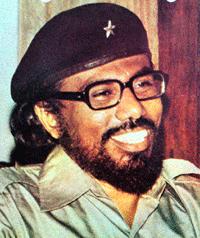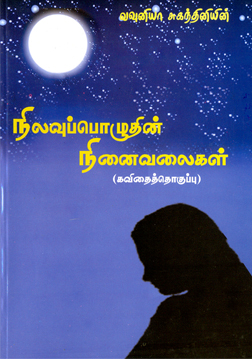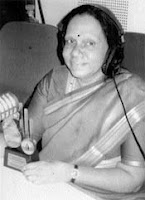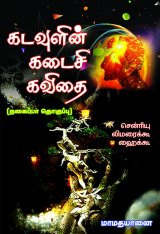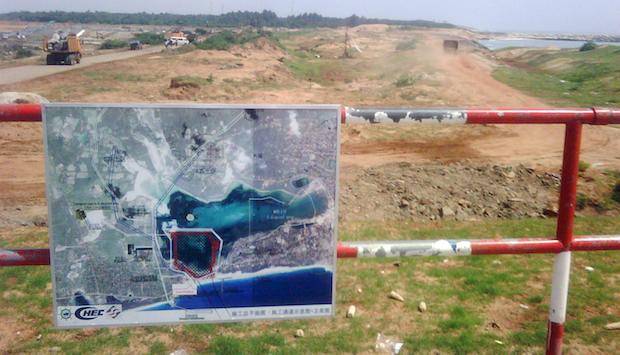

 “There are theories and there are facts. Theories vary… The facts however cannot be denied. Thousands of Tamils, old and young, and even little children, were assaulted, robbed, killed, bereaved, and made refugees. They saw their homes, possessions, vehicles, shops and factories plundered, burnt or destroyed. These people were humiliated, made to live in fear and rendered helpless…” A Cry From the Heart… What happened at the end of July 1983? (From Bishop Lakshman Wickremasinghe’s Final Pastoral Letter). Channel 4’s “Killing Fields” director Callum Macrae wrote last week; A 12-year-old boy lies on the ground. He is stripped to the waist and has five neat bullet holes in his chest. His name is Balachandran Prabakaran and he is the son of the LTTE leader, Velupillai Prabhakaran. He has been shot dead. Beside him lie the bodies of five men, believed to be his bodyguards. There are strips of cloth on the ground perhaps indicating that they were tied and blindfolded before they were shot – further evidence suggesting that the Sri Lankan government forces had a systematic policy of executing many surrendering or captured LTTE fighters and leading figures, even if they were children. The problem for the Sri Lankan government is that this murder is not isolated. If it was, they could perhaps dismiss it as the act of rogue soldiers.
“There are theories and there are facts. Theories vary… The facts however cannot be denied. Thousands of Tamils, old and young, and even little children, were assaulted, robbed, killed, bereaved, and made refugees. They saw their homes, possessions, vehicles, shops and factories plundered, burnt or destroyed. These people were humiliated, made to live in fear and rendered helpless…” A Cry From the Heart… What happened at the end of July 1983? (From Bishop Lakshman Wickremasinghe’s Final Pastoral Letter). Channel 4’s “Killing Fields” director Callum Macrae wrote last week; A 12-year-old boy lies on the ground. He is stripped to the waist and has five neat bullet holes in his chest. His name is Balachandran Prabakaran and he is the son of the LTTE leader, Velupillai Prabhakaran. He has been shot dead. Beside him lie the bodies of five men, believed to be his bodyguards. There are strips of cloth on the ground perhaps indicating that they were tied and blindfolded before they were shot – further evidence suggesting that the Sri Lankan government forces had a systematic policy of executing many surrendering or captured LTTE fighters and leading figures, even if they were children. The problem for the Sri Lankan government is that this murder is not isolated. If it was, they could perhaps dismiss it as the act of rogue soldiers.

 திலகபாமா ஒரு கவிஞர். இதோடு நான் நிறுத்திக்கொள்ள வேண்டும். ஆனால் சமீபகாலமாக இது சாத்தியமில்லாது போய்க்கொண்டு இருக்கிறது. நான் கவிஞர் என்று சொல்வதோடு நிறுத்திக்கொண்டாலும், பெயரைப் பார்த்து பெண் கவிஞர் என்றும் சேர்த்துப் படித்துக்கொண்டு, அதற்கான இன்றைய தமிழ்ச் சூழலின் அர்த்தங்களையும் தானே தந்து படித்துக்கொள்ளும் இன்றைய தமிழ் வாசக மனம். பெண் கவிஞர் என்றால் பெண்ணீயக் கவிஞர் என்று படிக்கப் படும். பெண்ணீயக் கவிஞர் என்றால் அதற்கான குண வரையரைகள் தரப்பட்டு தயாராக உள்ளன. அதற்கான பெண்ணிய மொழியும் ஒன்று தயார் செய்யப்பட்டுள்ளது, அந்த பெண்ணிய மொழியின் அகராதியை நான் இங்கு சொல்ல முடியாது. தெரிந்தவர் தெரிந்து கொள்வார்கள். இதெல்லாம் போக, பெண்ணிய கவிதைகளுக்கு இலக்கணம் வகுக்கும் ஒரு வழிகாட்டியாக தன்னை வரித்துக்கொண்டுள்ள ஒரு பத்திரிகாசிரியர், ”உங்க கவிதையிலே கொஞ்சம் பெண்ணிய மொழியும் தூவிக்கொண்டாங்க போட்டிரலாம்” என்று தன் பங்குக்கு உதவுவதாகவும் சொல்கிறார்கள். இதற்கெல்லாம் ”சம்மதம் இல்லை என் கவிதையில் என் மொழியும் என் பார்வைகளும் அனுபவங்களும் தான் இருக்கும்”, என்றால், பெண்ணியம் பேசாத பெண் கவிஞர் கவிஞராகவே அங்கீகரிக்கப்படமாட்டார். சங்கப் பலகையில் இடம் கிடைக்காது தான்.
திலகபாமா ஒரு கவிஞர். இதோடு நான் நிறுத்திக்கொள்ள வேண்டும். ஆனால் சமீபகாலமாக இது சாத்தியமில்லாது போய்க்கொண்டு இருக்கிறது. நான் கவிஞர் என்று சொல்வதோடு நிறுத்திக்கொண்டாலும், பெயரைப் பார்த்து பெண் கவிஞர் என்றும் சேர்த்துப் படித்துக்கொண்டு, அதற்கான இன்றைய தமிழ்ச் சூழலின் அர்த்தங்களையும் தானே தந்து படித்துக்கொள்ளும் இன்றைய தமிழ் வாசக மனம். பெண் கவிஞர் என்றால் பெண்ணீயக் கவிஞர் என்று படிக்கப் படும். பெண்ணீயக் கவிஞர் என்றால் அதற்கான குண வரையரைகள் தரப்பட்டு தயாராக உள்ளன. அதற்கான பெண்ணிய மொழியும் ஒன்று தயார் செய்யப்பட்டுள்ளது, அந்த பெண்ணிய மொழியின் அகராதியை நான் இங்கு சொல்ல முடியாது. தெரிந்தவர் தெரிந்து கொள்வார்கள். இதெல்லாம் போக, பெண்ணிய கவிதைகளுக்கு இலக்கணம் வகுக்கும் ஒரு வழிகாட்டியாக தன்னை வரித்துக்கொண்டுள்ள ஒரு பத்திரிகாசிரியர், ”உங்க கவிதையிலே கொஞ்சம் பெண்ணிய மொழியும் தூவிக்கொண்டாங்க போட்டிரலாம்” என்று தன் பங்குக்கு உதவுவதாகவும் சொல்கிறார்கள். இதற்கெல்லாம் ”சம்மதம் இல்லை என் கவிதையில் என் மொழியும் என் பார்வைகளும் அனுபவங்களும் தான் இருக்கும்”, என்றால், பெண்ணியம் பேசாத பெண் கவிஞர் கவிஞராகவே அங்கீகரிக்கப்படமாட்டார். சங்கப் பலகையில் இடம் கிடைக்காது தான்.

 ஒரு ஆக்க இலக்கியப் படைப்பாளியாக இல்லாது போனாலும், 25 ஆண்டுகள் நூலகராக இருந்த அனுபவம், பத்தாண்டுகளாக நூல்தேட்டம் என்ற ஈழத்துத் தமிழ் நூற்பட்டியலைத் தொகுத்து 8000 ஈழத்துத் தமிழ் நூல்களைப் பதிவுசெய்து வழங்கிய அனுபவம், இரண்டொரு ஈழத்துத் தமிழ்ப் பதிப்பாளர்களுடன் இணைந்து கடந்த இரு ஆண்டுகளாக லண்டனில் ஈழத்துத் தமிழ்ப் புத்தகச் சந்தையை பல இடங்களிலும் நடத்தி சராசரி வாசகர்கள் பற்றிப் பெற்றுக்கொண்ட அனுபவம் இவை அனைத்தும் என்னை இக்கட்டுரையை எழுதத் தூண்டியுள்ளது. எம்மவரிடையே வாசிப்புத் தரம் குறைந்துவிட்டது என்று வெளிப்படையான உண்மையைச் சொல்லி ஒதுங்கிக்கொள்ள நான் விரும்பவில்லை. அதிலிருந்து எவ்வாறு மீளலாம் என்ற சிந்தனையின் வெளிப்பாடே இக்கருத்துக்கள். வாசிப்பு என்பது கல்வித் தேவைகளுக்காகவும், அதற்கப்பால் உள்ள விரிந்த தேடலுக்கும் என இரண்டு வகைகளில் இங்கு நிகழ்கின்றது.
ஒரு ஆக்க இலக்கியப் படைப்பாளியாக இல்லாது போனாலும், 25 ஆண்டுகள் நூலகராக இருந்த அனுபவம், பத்தாண்டுகளாக நூல்தேட்டம் என்ற ஈழத்துத் தமிழ் நூற்பட்டியலைத் தொகுத்து 8000 ஈழத்துத் தமிழ் நூல்களைப் பதிவுசெய்து வழங்கிய அனுபவம், இரண்டொரு ஈழத்துத் தமிழ்ப் பதிப்பாளர்களுடன் இணைந்து கடந்த இரு ஆண்டுகளாக லண்டனில் ஈழத்துத் தமிழ்ப் புத்தகச் சந்தையை பல இடங்களிலும் நடத்தி சராசரி வாசகர்கள் பற்றிப் பெற்றுக்கொண்ட அனுபவம் இவை அனைத்தும் என்னை இக்கட்டுரையை எழுதத் தூண்டியுள்ளது. எம்மவரிடையே வாசிப்புத் தரம் குறைந்துவிட்டது என்று வெளிப்படையான உண்மையைச் சொல்லி ஒதுங்கிக்கொள்ள நான் விரும்பவில்லை. அதிலிருந்து எவ்வாறு மீளலாம் என்ற சிந்தனையின் வெளிப்பாடே இக்கருத்துக்கள். வாசிப்பு என்பது கல்வித் தேவைகளுக்காகவும், அதற்கப்பால் உள்ள விரிந்த தேடலுக்கும் என இரண்டு வகைகளில் இங்கு நிகழ்கின்றது.
 வவுனியாவைச் சேர்ந்த திருமதி சந்திரமோகன் சுகந்;தினி எழுதிய நிலவுப் பொழுதின் நினைவலைகள் என்ற கவிதைத்தொகுதி வவுனியா தமிழ்ச் சங்கத்தின் வெளியீடாக வெளிவந்திருக்கிறது. இதில் 53 பக்கங்களை உள்ளடக்கியதாக 27 தலைப்புக்களில் கவிதைகள் இடம்பெற்றிருக்கின்றன. இத்தொகுதி சுகந்தினியின் கன்னிக் கவிதைத் தொகுதியாகும். சில கவிதைத் துளிகளும் இதில் உள்ளடங்குகின்றன. அன்னையின் பெருமை, அன்பு, காதல், உறவு, மது, சீதனம், சேமிப்பு, பெண்ணியம், ஆசிரிய மாண்பு ஆகிய கருப்பொருளை மையமாகக் கொண்டு இக்கவிதைகள் புனையப்பட்டுள்ளன. கவிதைக்குப் பொய்யழகு என்று கவிப்பேரரசே சொல்லியுள்ள போதும், பொய்களைப் புறந்தள்ளி வைத்து அன்றாட வாழ்வில் நாம் ஒவ்வொருவரும் சந்தித்த, சந்தத்துக்கொண்டிருக்கும், சந்திக்க இருக்கும் சவால்கள், வாழ்வின் யதார்த்தங்கள் என்பவற்றை இலகு நடையில் எவரும் விளங்கிக்கொள்ளக்கூடிய வகையில் என் சிந்தைக்கெட்டிய உள்ளத்து உணர்வுகளை கவிதைக்கு உண்மையும் அழகே என்று நீங்கள் யாவரும் உணரும் வகையிலான கவிதைகளாகத் தந்துள்ளேன் என்று நூலாசிரியர் தனதுரையில் குறிப்பிடுகிறார்.
வவுனியாவைச் சேர்ந்த திருமதி சந்திரமோகன் சுகந்;தினி எழுதிய நிலவுப் பொழுதின் நினைவலைகள் என்ற கவிதைத்தொகுதி வவுனியா தமிழ்ச் சங்கத்தின் வெளியீடாக வெளிவந்திருக்கிறது. இதில் 53 பக்கங்களை உள்ளடக்கியதாக 27 தலைப்புக்களில் கவிதைகள் இடம்பெற்றிருக்கின்றன. இத்தொகுதி சுகந்தினியின் கன்னிக் கவிதைத் தொகுதியாகும். சில கவிதைத் துளிகளும் இதில் உள்ளடங்குகின்றன. அன்னையின் பெருமை, அன்பு, காதல், உறவு, மது, சீதனம், சேமிப்பு, பெண்ணியம், ஆசிரிய மாண்பு ஆகிய கருப்பொருளை மையமாகக் கொண்டு இக்கவிதைகள் புனையப்பட்டுள்ளன. கவிதைக்குப் பொய்யழகு என்று கவிப்பேரரசே சொல்லியுள்ள போதும், பொய்களைப் புறந்தள்ளி வைத்து அன்றாட வாழ்வில் நாம் ஒவ்வொருவரும் சந்தித்த, சந்தத்துக்கொண்டிருக்கும், சந்திக்க இருக்கும் சவால்கள், வாழ்வின் யதார்த்தங்கள் என்பவற்றை இலகு நடையில் எவரும் விளங்கிக்கொள்ளக்கூடிய வகையில் என் சிந்தைக்கெட்டிய உள்ளத்து உணர்வுகளை கவிதைக்கு உண்மையும் அழகே என்று நீங்கள் யாவரும் உணரும் வகையிலான கவிதைகளாகத் தந்துள்ளேன் என்று நூலாசிரியர் தனதுரையில் குறிப்பிடுகிறார்.
இலங்கை மண்ணுக்கு புகழ் பெற்றுத் தந்த பெண் அறிவிப்பாளர் திருமதி இராஜேஸ்வரி சண்முகம் அவர்களது நினைவாக ,’தடாகம் கலை இலக்கிய வட்டம் ‘(அஞ்சலி கவிதை )நிகழ்வினை கல்முனையில்…
 களப்பிரர் படையெடுப்பால் தமிழகத்தில் தமிழ மூவேந்தர் ஆட்சி குலைந்து சங்க காலம் முடிவுற்ற பின்பு எல்லாத் துறைகளிலும் கோலோச்சிய தமிழ் என்ற நிலை மாறி தமிழ் அரசின் ஆட்சி மொழி, மத வழிபாட்டு மொழி என்று இல்லாமல் போகும் அவலநிலை தோன்றியது. களப்பிரரும், பல்லவரும் தமிழருக்கு அயலான பிராகிருதத்தை அரசவை மொழி ஆக்கினர். தமது அரசாணைகளையும், நிலக் கொடை ஆவணங்களையும் பிராகிருதத்திலேயே வெளியிட்டு மக்கள் மொழியாம் தமிழைப் புறக்கணித்தனர். பல்லவர் பின்பு சமற்கிருதத்தை ஆதரித்தனர். ஆயினும் பல்லவருக்கு அடங்கிய சிற்றரசர்களும் வேளிரும் எளியோரும் தமிழைப் போற்றிப் பாதுகாத்தனர். இதற்கு சான்றாக அமைந்தவை தாம் போரிலும், பூசலிலும் பங்கெடுத்து வீரச்சாவு எய்திய மறவர்களின் நினைவாக எடுப்பிக்கப்பட்ட நடுகல் கல்வெட்டுகள்.
களப்பிரர் படையெடுப்பால் தமிழகத்தில் தமிழ மூவேந்தர் ஆட்சி குலைந்து சங்க காலம் முடிவுற்ற பின்பு எல்லாத் துறைகளிலும் கோலோச்சிய தமிழ் என்ற நிலை மாறி தமிழ் அரசின் ஆட்சி மொழி, மத வழிபாட்டு மொழி என்று இல்லாமல் போகும் அவலநிலை தோன்றியது. களப்பிரரும், பல்லவரும் தமிழருக்கு அயலான பிராகிருதத்தை அரசவை மொழி ஆக்கினர். தமது அரசாணைகளையும், நிலக் கொடை ஆவணங்களையும் பிராகிருதத்திலேயே வெளியிட்டு மக்கள் மொழியாம் தமிழைப் புறக்கணித்தனர். பல்லவர் பின்பு சமற்கிருதத்தை ஆதரித்தனர். ஆயினும் பல்லவருக்கு அடங்கிய சிற்றரசர்களும் வேளிரும் எளியோரும் தமிழைப் போற்றிப் பாதுகாத்தனர். இதற்கு சான்றாக அமைந்தவை தாம் போரிலும், பூசலிலும் பங்கெடுத்து வீரச்சாவு எய்திய மறவர்களின் நினைவாக எடுப்பிக்கப்பட்ட நடுகல் கல்வெட்டுகள்.
 -வானொலி என்றால் அது இலங்கை தான். அது போல வானொலிக் குரலுக்குச் சொந்தக்காரி மதிப்பிற்குரிய அம்மா திருமதி இராஜேஸ்வரி சண்முகம். குழல் இனிது, யாழ் இனிது, மழலைச்சொல் கேளாதவர், ஆனால் திருமதி இராஜேஸ்வரி சண்முகம் அவர்களது குரலில் ஒரு ஈர்ப்புச் சக்தி இருக்கின்றது.எழுத்துக்கள் உச்சரிக்கும் பொழுது வார்த்தைகள் சகா வரம் பெறுகின்றன. சொல் நயம், ஒலி நயம், அதற்கெல்லாம் மேலாக இயற்கை கொடுத்த குரல் நயம் அதை உபயோகிக்கக் கூடிய “சூழ் கலை நயம்”. வானொலி செய்த பாக்கியமோ, நேயர்கள் செய்த பாக்கியமோ, இலங்கைசெய்த பாக்கியமோ, எல்லாவற்றிக்கும் மேலாக நாம் கேட்கும் பாக்கியம்! மழையின் சாரல்களை அவரின் குரலில் செவிமடுக்கின்றோம். அலங்காரத்தின் அலங்காரமாய் ஜொலிக்கிறார் அவர் குரலால் கேட்கிறோம்.
-வானொலி என்றால் அது இலங்கை தான். அது போல வானொலிக் குரலுக்குச் சொந்தக்காரி மதிப்பிற்குரிய அம்மா திருமதி இராஜேஸ்வரி சண்முகம். குழல் இனிது, யாழ் இனிது, மழலைச்சொல் கேளாதவர், ஆனால் திருமதி இராஜேஸ்வரி சண்முகம் அவர்களது குரலில் ஒரு ஈர்ப்புச் சக்தி இருக்கின்றது.எழுத்துக்கள் உச்சரிக்கும் பொழுது வார்த்தைகள் சகா வரம் பெறுகின்றன. சொல் நயம், ஒலி நயம், அதற்கெல்லாம் மேலாக இயற்கை கொடுத்த குரல் நயம் அதை உபயோகிக்கக் கூடிய “சூழ் கலை நயம்”. வானொலி செய்த பாக்கியமோ, நேயர்கள் செய்த பாக்கியமோ, இலங்கைசெய்த பாக்கியமோ, எல்லாவற்றிக்கும் மேலாக நாம் கேட்கும் பாக்கியம்! மழையின் சாரல்களை அவரின் குரலில் செவிமடுக்கின்றோம். அலங்காரத்தின் அலங்காரமாய் ஜொலிக்கிறார் அவர் குரலால் கேட்கிறோம்.

சப்பானில் மதுபானக்கூடங்களிலும் தேனீர் கடைகளிலும் வளர்தேடுக்கப்பட்ட கவிதை வகையே சென்ரியு. இக்கவிதை வகை தமிழில் நகைப்பா என்று வழங்கப்படுகின்றது. சென்ரியு கவிதைகள் மனித நடத்தைகளையும் சமுதாய அவலங்களையும் வெளிப்படையாக போட்டுடைப்பவை. கிண்டல், நகைச்சுவை, அங்கதத் தன்மை வாய்ந்ததாக இக்கவிதைகள் படைக்கப்படுகின்றன. ’கடவுளின் கடைசி கவிதை’ எனும் சென்ரியு கவிதை நூலானது வனிதா பதிப்பகத்தால் வெளியிடப்பட்டுள்ளது. இந்த நூலில் மனித நடத்தைகள் யாவும் வெளிப்படையாக கவிதைகளாகப் படைக்கப்பட்டுள்ளன. மேலும், லிமரைக்கூ, ஹைக்கூ கவிதைகளும் இத்தொகுப்பில் இடம்பெற்றுள்ளது.
 24 March 2012- Global Tamil Forum (GTF) commends the passing of the UN resolution on Sri Lanka, at the current Human Rights Council (HRC) session in Geneva, as a crucial first step towards accountability and justice for victims on the island. Tamils all over the world are thankful to the United States for spearheading the initiative and to all those who have made this first meaningful step possible. We are most encouraged by India for having made a significant vote in favour of addressing human rights abuses and the importance that accountability plays in facilitating just peace. In addition to the lobbying efforts of the Tamil Diaspora, Tamils in Tamil Nadu and Malaysia, many international parliamentarians, media organisations, non-government bodies and some progressive human rights activists from the South of Sri Lanka have all contributed towards the success of this Resolution. GTF encourages all Tamil political parties in Sri Lanka to convey to the Tamil population the significance of this passing of the resolution as a constructive move towards accountability and sustainable reconciliation.
24 March 2012- Global Tamil Forum (GTF) commends the passing of the UN resolution on Sri Lanka, at the current Human Rights Council (HRC) session in Geneva, as a crucial first step towards accountability and justice for victims on the island. Tamils all over the world are thankful to the United States for spearheading the initiative and to all those who have made this first meaningful step possible. We are most encouraged by India for having made a significant vote in favour of addressing human rights abuses and the importance that accountability plays in facilitating just peace. In addition to the lobbying efforts of the Tamil Diaspora, Tamils in Tamil Nadu and Malaysia, many international parliamentarians, media organisations, non-government bodies and some progressive human rights activists from the South of Sri Lanka have all contributed towards the success of this Resolution. GTF encourages all Tamil political parties in Sri Lanka to convey to the Tamil population the significance of this passing of the resolution as a constructive move towards accountability and sustainable reconciliation.
 Mar 23, 2012 – Since India’s vote supporting the resolution against Sri Lanka at the UN Human Rights Council (UNHRC) that called for promotion of reconciliation and accountability for alleged violations of International law, the predominant Delhi-centric analyses have been that India has committed an awful blunder. The most common arguments that emerged from the conventional geo-political logic, that completely failed to see the political and public sentiments in Tamil Nadu, as well as the overwhelming evidence of alleged war crimes and human rights violations in Sri Lanka, centred around the following: India has voted against a traditional ally-neighbour and it’s a strategic blunder vis-a-vis China and Pakistan. The chatter also highlighted that the entire Asian block voted in favour while India sided with the West, and that it will further stoke Sinhala nationalism and marginalisation of Tamils. It wasn’t surprising that most of them, except a few like Kamal Mitra Chinoy, Brahma Chellany and Manoj Joshi, spoke about the issue in the same breath as they speak about Pakistan.
Mar 23, 2012 – Since India’s vote supporting the resolution against Sri Lanka at the UN Human Rights Council (UNHRC) that called for promotion of reconciliation and accountability for alleged violations of International law, the predominant Delhi-centric analyses have been that India has committed an awful blunder. The most common arguments that emerged from the conventional geo-political logic, that completely failed to see the political and public sentiments in Tamil Nadu, as well as the overwhelming evidence of alleged war crimes and human rights violations in Sri Lanka, centred around the following: India has voted against a traditional ally-neighbour and it’s a strategic blunder vis-a-vis China and Pakistan. The chatter also highlighted that the entire Asian block voted in favour while India sided with the West, and that it will further stoke Sinhala nationalism and marginalisation of Tamils. It wasn’t surprising that most of them, except a few like Kamal Mitra Chinoy, Brahma Chellany and Manoj Joshi, spoke about the issue in the same breath as they speak about Pakistan.
